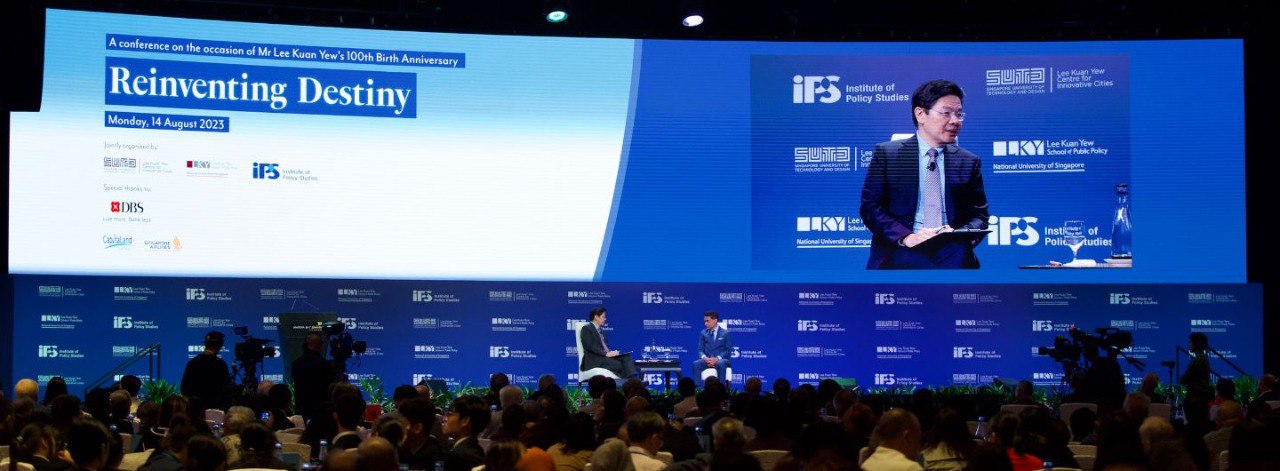DPM Lawrence Wong at the Ministerial Dialogue on Reinventing Destiny
PM Lawrence Wong
Economy
Finance
Foreign affairs
14 August 2023
Remarks by Deputy Prime Minister and Minister for Finance Lawrence Wong at the Ministerial Dialogue on "Reinventing Destiny" - A Conference on the Occasion of Mr Lee Kuan Yew's 100 Birthday, on 14 August 2023.
This article has been migrated from an earlier version of the site and may display formatting inconsistencies.

Let me start by saying I am very happy to join all of you for this conference to mark the centennial year of Mr Lee Kuan Yew’s birth. Since independence, Singapore has defied the odds of history and we have charted our own destiny. When we started out, the journey was very daunting, and we had many problems to overcome. But our founding leaders under Mr Lee Kuan Yew as well as our pioneers dealt with the challenges head on and helped to build the thriving metropolis that we have today.
Of course, now when we look ahead, there are new challenges, lots of uncertainties around us. We look at a world that is topsy turvy, full of geopolitical tensions, economic fragmentation, technological disruptions, and there are many things to deal with. But I would like to highlight three broad shifts that we have to worry about.
First, the global multilateral trading system is under siege and will evolve. The last few decades saw a remarkable consensus around free trade and win-win economic cooperation. Countries did not have to be friends to do business with one another. In fact, we encouraged and promoted interdependence for greater stability. Now that consensus is over, it is not quite clear what will take its place, but we are seeing the outlines of a new paradigm emerging, certainly in the US and the G7. It is a paradigm with more active state involvement in markets. Understandably, from the Western developed world point of view, they would like to rebuild their industrial bases, reduce exposure to geopolitical rivals, and ultimately shore up security. And this will have huge implications for all of us.
Second, and a related point, is I do not think in the foreseeable future we will see deglobalisation happening. In fact, if you look at overall trade flows, they have remained healthy, above pre-Covid-19 levels, but we will see a different pattern of globalisation – shifts in the way trade and investments are made, not so much shaped by economic logic anymore, but much more by geopolitical alignment and security.
We already see the bifurcation in high-end semiconductor chips, and I am sure that bifurcation will expand to new areas, particularly contested areas of technology like quantum computing or artificial intelligence. We hope it would not go beyond that, but even a selective bifurcation into two technological spheres will have tremendous impact and profound implications for the entire economy.
Thirdly, how all of this unfolds ultimately will depend on the US-China relationship. There has already been a big shift in the nature of the relationship, because for a long time, the US talked about strategic engagement and getting China to be a responsible stakeholder in the global system, but there is now a growing sense in America that that approach has failed, that China's rise threatens America's interests and values, and so we have shifted from strategic engagement to strategic competition.
To be clear, neither side wants an outright confrontation, neither side wants to go to war, but intense or, if not, extreme competition will be the defining feature in the bilateral relationship. We hope there will be guard-rails to manage that competition, but we have to be prepared for unpredictable or even dangerous outcomes emerging. And we all know that there are hotspots in the region, including in the Taiwan Strait and South China Sea, where accidents and miscalculations can happen.
So these are the major changes around us that we have to be prepared for. We wish none of this were happening, because all of these big changes really mean that we will be operating in an external environment that will be less benign and less hospitable for small states like Singapore. But we have to take the world as it is, not as we would like it to be. So we will just have to adapt and learn to navigate in this new environment.
At the same time, I think we should take heart that there are silver linings even in the darkest of clouds. And so even in this new environment, there will be new opportunities for small countries like us. In fact, if you look at the Singapore Story, it has always been about turning every challenge into opportunity, converting every vulnerability into strength, and we are starting off in a far stronger position today – we have more resources, we are better equipped to deal with our vulnerabilities, we have a good system in place to adapt and adjust and put in place effective long term policies, and we have a solid reputation as a reliable and trusted hub for the region and the world. So we can build on all of these competitive strengths to move forward.
In the end, our ability to re-invent destiny as it were, depends not just on the Government, but on all of us in Singapore, because Singapore will always be an improbable and unlikely nation forged out of the collective will of our people. So if we keep faith with each other, we will be able to chart our way forward in this uncertain world and continue to write many more chapters of the Singapore Story.
Explore related topics
